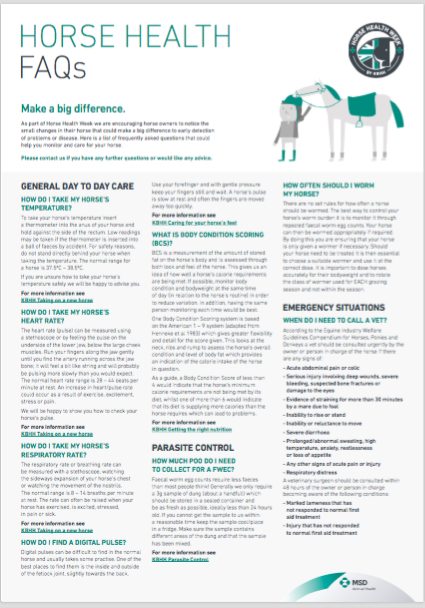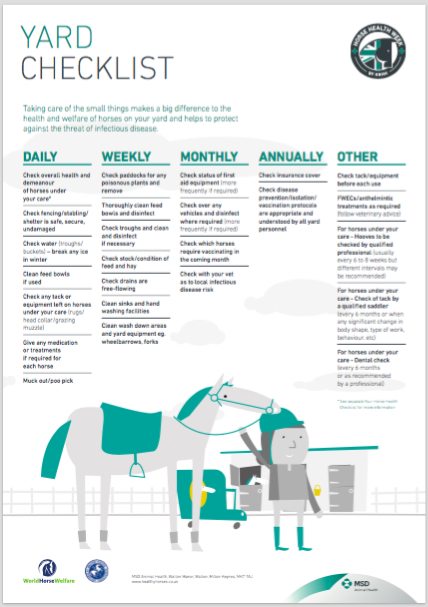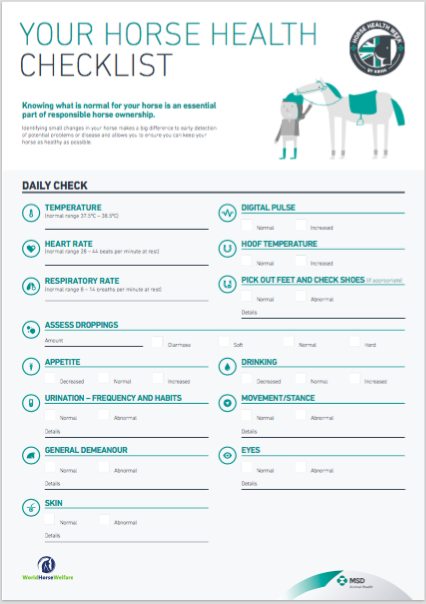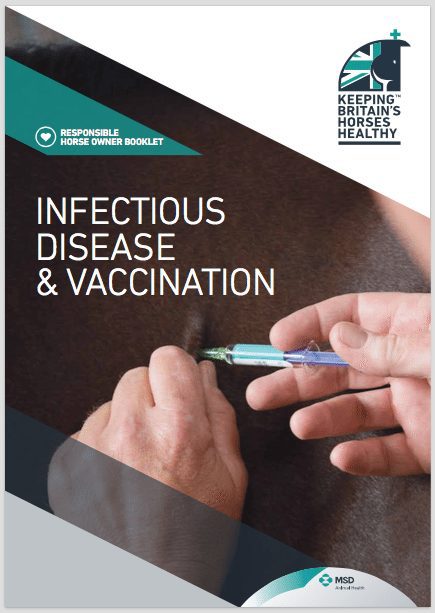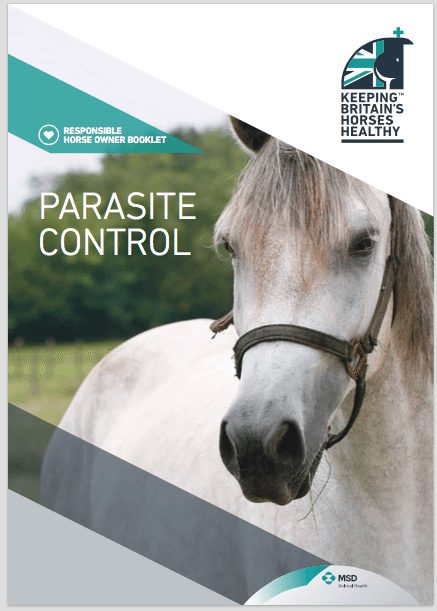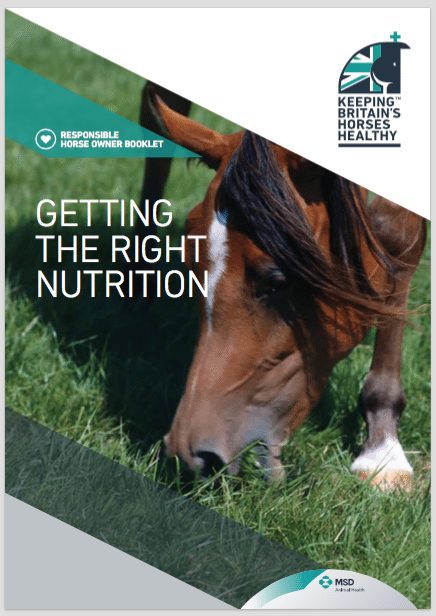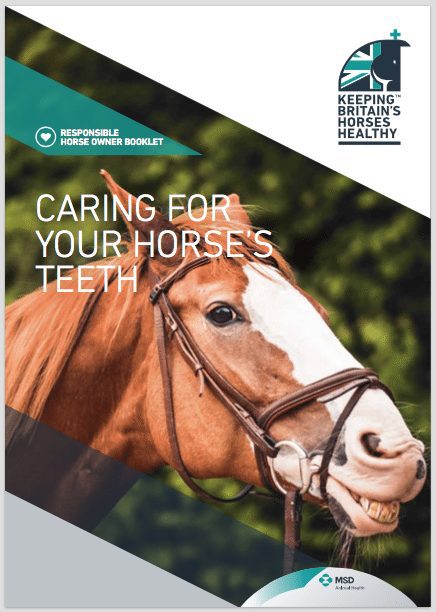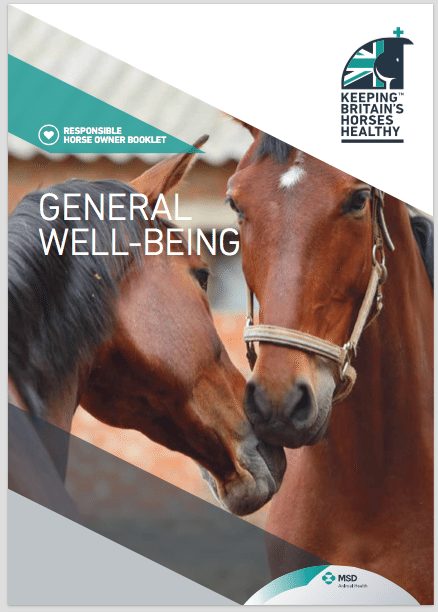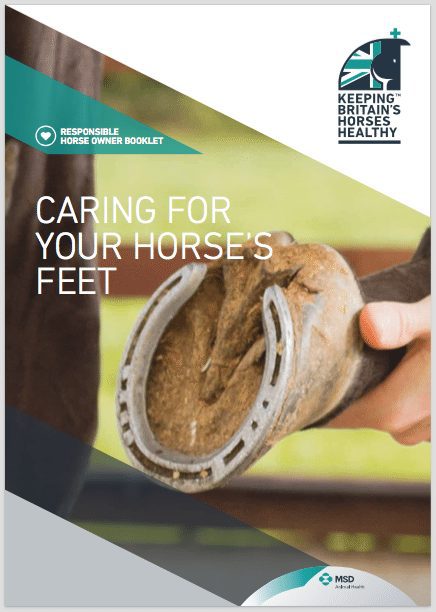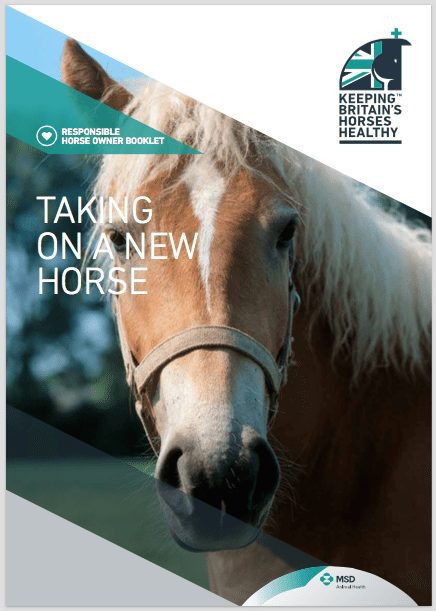Farr & Pursey Equine are proud to be part of the Keeping Britain’s Horses Healthy Campaign in conjunction with MSD Animal Health. Find out more information below and download all of the information booklets.
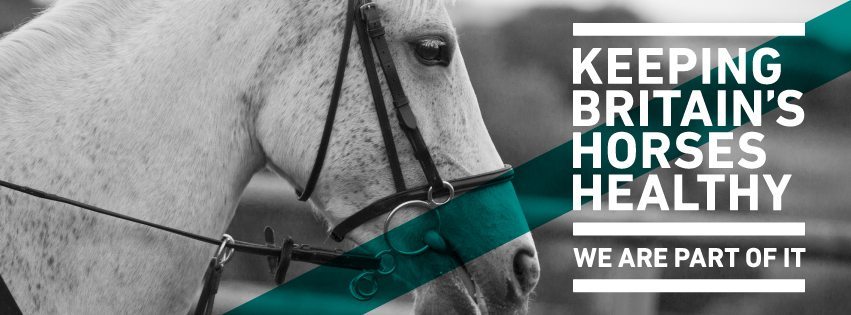
Click on the images below to download
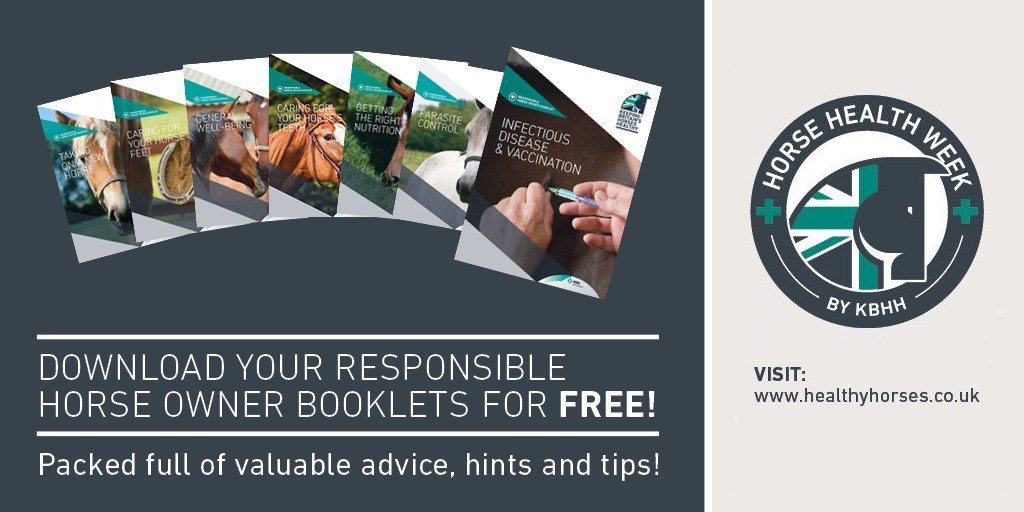
Equine infectious disease can severely affect a horse’s health and performance and in some cases prove fatal.
As in humans, prevention is better than cure and vaccination is a key element in the fight against infectious disease. Vaccination helps horses fight the infection and if a horse does develop disease, it will decrease the severity of signs.
Vaccination is the best way to protect your horse, and others around it, from infectious and contagious diseases and is most effective when a high percentage of the population is vaccinated. This is known as herd immunity.
Herd immunity describes the situation where enough horses are vaccinated against the disease, so it is unable to spread because there are too few susceptible horses left to propagate the outbreak.
Vaccination against ‘flu’ is of course compulsory for competition horses but it is worth remembering that even if your horse does not leave the yard it is likely that he is part of a herd whether this is his field companion, the other horses on the yard or even the other horses in your local area.
In Britain it is estimated that less than 50% of horses are vaccinated against ‘flu’, yet it is widely agreed that to achieve an effective level of herd immunity vaccination rates need to be considerably higher in the region of 70%.
Tetanus on the other hand whilst not contagious is only preventable through vaccination of that individual. All horses are at risk of tetanus as the bacteria which cause the disease are usually picked up through wounds, with punctures of the sole being a common route of entry.
As well as keeping your horses vaccinations up to date, it is important to focus on good yard management practices which help keep diseases out and at least limit their spread should they enter. Such practices include setting up a suitable isolation area for new arrivals or sick horses, following good hygiene procedures and having yard protocols in place which determine the sequence of events which should occur if an outbreak of disease does strike.
Speak to us here at the practice for more information about vaccination and help implementing practical everyday biosecurity measures which will help keep your yard and your horses healthy. You can also download your FREE Responsible Horse Owner booklet on this subject from our website www.farrandpursey.com or from www.healthyhorses.co.uk.
Whilst most of us understand the need to worm our horses, there is evidence to suggest that many of us are not treating our horses in the most effective way. With an increasing risk of resistance to anthelmintics (wormers), it is vital that we adopt a proper worming strategy to protect our horses and ponies from the threat of irreversible damage. Equally there are many external parasites which affect horses. Early recognition and prompt treatment of these will allow for more effective control.
Regular and intensive worming treatments have led to the development of resistance to most of the currently available wormers and this rate of development is directly correlated with frequency of use. To help limit this impact and help preserve our wormers, it is really important that you only worm your horse when it is absolutely necessary. To do this you should follow a targeted worming programme which ensures you target specific worms with an effective product at the correct time of year whilst using faecal worm egg count testing during the grazing season (April to October) to identify which horses need a wormer during this period. This can be a daunting task and here at the practice we are happy to advise on the most appropriate worming plan for your horse. It is important that all horses on a yard are following the same plan and as such we can discuss and help prepare a yard protocol.
External parasites can also be bothersome at certain times of year. Flies and midges are a particular problem throughout the summer months, mostly for those horses which develop allergic type symptoms to their bites such as ‘sweet itch’ and ‘urticaria’. It is worth employing preventative methods to help control the situation and limit the exposure your horse has to both flies and midges during these months. Other external parasites such as lice and chorioptic mange can be treated if your horse starts displaying symptoms.
Speak to us here at the practice for further information on faecal worm egg counts and how we can help you control the parasite populations in your horse and on your yard more effectively. You can also download your FREE Responsible Horse Owner booklet on this subject from our website www.farrandpursey.com or from www.healthyhorses.co.uk.
Getting nutrition right is crucial in helping to ensure a fit and healthy horse. Horses have evolved as trickle feeders, designed to be chewing or occupied by feed for a large portion of their day. Their digestive systems are primarily designed to digest fibre and, therefore, forage (hay/haylage/grass) should represent the majority of their diet.
As we expect much more of the domesticated horse in terms of workload, and often the forage provided is limited or of less than ideal quality, a forage only diet is unlikely to provide all the nutrients a horse needs. It can often be more obvious whether or not calorie/energy requirements are being met, than whether vitamin and mineral requirements are being met. As a result it is important to feed a hard/compound feed to complement the forage and provide your horse with a fully balanced diet. Depending on the workload of your horse and their ability to maintain weight this may mean just providing a complementary balancer.
Ensuring your horse is on a balanced diet will help keep him full of energy, keep his skin and feet in good condition and will help prevent many more serious illnesses from occurring.
Following a simple set of feeding do’s and don’ts will help prevent many problems from arising at the first instance. Such advice includes feeding little and often, feeding plenty of fibre, establishing a feeding and management routine, providing plenty of clean fresh water, and avoiding making sudden changes to the diet. The horse, as a hindgut fermenter is particularly susceptible to small changes and overloads of the digestive system which can quickly lead to diarrhoea, impactions (constipation) or gastric ulcers which in turn can lead to colic.
Keeping a close eye on your horse’s weight and body condition score on a regular basis will give you a good indication as to whether or not his calorie requirements are being met. Ideally this should be performed every couple of weeks to allow you to pick up small variations so that you can implement small yet effective changes to his diet before a problem escalates.
Talk to us here at the practice if you have concerns about how or what you should be feeding your horse particularly if he or she is prone to developing nutritional related disorders such as laminitis or recurrent colic. We can also give you advice on how to implement practical management and diet changes which can help you get your horse to the correct bodyweight and body condition score for him. You can also download your FREE Responsible Horse Owner booklet on this subject from our website www.farrandpursey.com or from www.healthyhorses.co.uk.
Good dental care is essential to your horse’s well-being, to prevent disease and ensure they are comfortable when eating and being ridden. Monitoring your horse closely for signs of dental disease is important so you can identify any potential issues early, being mindful that some horses with advanced dental disease suffer in silence. It is also vital to provide enough good quality long fibre so that your horse has to chew for a large proportion of the day. Regular dental check-ups are crucial in preventing problems from occurring as well as allowing disease to be diagnosed and treatment instigated. Early detection and treatment of dental abnormalities is vital as one problem tends to lead to a variety of problems over time. As always prevention is better than cure.
Horses are designed to chew for over 18 hours a day and as such have extremely hard wearing teeth. The teeth wear at a rate of approximately 2-3 mm per year and to compensate for this the teeth will continue to erupt into the mouth through the gum line at a similar rate until he reaches an age when there is simply nothing left to erupt. Domestication and modern husbandry practices often limit how much a horse can chew a day and so dental abnormalities can arise relatively easily. Signs which may indicate your horse has a problem with his teeth are halitosis, slow eating, dropping partially chewed food, pocketing of food within checks, weight loss, partially digested food within droppings or even an unstable head carriage when ridden. Even if your horse isn’t displaying any symptoms this does not mean his mouth is comfortable as many horses will suffer in silence.
At the practice we advise regular dental checks to help identify any abnormalities and allow early correction and treatment. The frequency of these check-ups will depend on a number of factors including age and any previous problems and we can advise on this at the time of examination. It is routine for most horses to have their teeth checked every 6-12 months. The dental exam will also allow routine rasping to keep your horse’s mouth in good working order. Routine dental examinations, together with providing enough good quality long fibre are the most important considerations to keeping your horse’s teeth and mouth healthy and comfortable.
If you have any concerns about your horse’s teeth or to book a dental examination appointment please call us at the practice. You can also download your FREE Responsible Horse Owner booklet on this subject from our website www.farrandpursey.com or from www.healthyhorses.co.uk.
Being a responsible horse owner is not only about ensuring your horse’s physical needs are met, but it is also about considering your horse’s general well-being and environmental needs.
Domestication has changed the way horses are managed and we must remember that they are social animals that are, in general, happiest living in herds. As such considerations must be given to the type of environment they are kept in.
There are a variety of other issues that you might encounter as a horse owner such as deciding whether to breed from your horse and preparing for euthanasia. Both of these decisions need careful consideration and here at the practice we are happy to discuss available options with you.
The highest priority we should pay to our horses (and for that matter any other animals under our care) is to ensure that we follow the five freedoms:
Freedom from hunger and thirst by providing enough fresh water and the right type and amount of food to keep them fit.
Freedom from discomfort by making sure that animals have the right type of environment, including shelter and somewhere comfortable to rest.
Freedom from pain, injury and disease by preventing them from getting ill or injured and by making sure animals are diagnosed and treated rapidly if they do.
Freedom from fear and distress by making sure their conditions and treatment avoid mental suffering.
Freedom to behave normally by making sure animals have enough space, proper facilities and the company of other animals of their own kind.
If we attain all of these whilst being mindful of not placing human needs and preferences before the needs of our horse, we are well on the way to ensuring our horses will be physically healthy and mentally happy.
Speak to us here at the practice if you have any concerns or questions about your horse’s well-being, we are only too happy to help. You can also download your FREE Responsible Horse Owner booklet on this subject from our website www.farrandpursey.com or from www.healthyhorses.co.uk.
Hoof care is an extremely important aspect of horse ownership but is also an area that can get overlooked in a busy day-to-day schedule. The old saying ‘No foot, No horse’ still holds true today and whilst as an owner you cannot do much mechanically to the hooves, daily care and observation are vital to avoiding potentially serious and life threatening problems. Getting to know what is normal for your horse will help you to spot anything out of the ordinary, therefore enabling you to take direct action to prevent potential problems in the future.
It is really important that an appropriately qualified farrier attends your horse regularly to undertake trimming and if necessary, shoeing. Regardless of whether your horse is shod or unshod you should have an understanding of his feet and become familiar with his individual hoof conformation. At the practice we are happy to work with your farrier to ensure that you can keep your horse’s feet in the best possible condition. We can offer advice on routine hoof care and are happy to answer any questions or issues you may have.
Picking out the hooves on at least a daily basis is important in many ways and provides a vital opportunity to closely inspect all aspects of the hoof. The frog should be regularly inspected for damage and cuts and for conditions like thrush. In turn, the sole should be examined for puncture wound, cuts and stones wedged beside the frog. The wall needs to be inspected for excessive growth or excessive wear and the white line should be checked to ensure it is free from trapped grit which may cause an opportunity for an infection if not discovered in time.
Feeling you horse’s digital pulses is a very useful way of assessing conditions that may be occurring within the hooves, however they are of little help if you do not know what they feel like when everything is normal. It does take a little practice and we can show you how to do this when we are next visiting your horse. One of the best places to find them is over the inside and outside of the fetlock joint, slightly towards the back. Use your thumb and forefinger and with gentle pressure keep your fingers still, and wait. A horse’s pulse is slow at rest and often the fingers are moved away too quickly.
Speak to us here at the practice for further information on hoof care and how we can work with you and your farrier to ensure your horses hooves are in the best condition possible. You can also download your FREE Responsible Horse Owner booklet on this subject from our website www.farrandpursey.com or from www.healthyhorses.co.uk.
Horses need a lot of time and dedication as well as your love and care. Owning and caring for a horse will involve some expenditure which needs to be budgeted for including feed, livery, bedding, equipment, vaccinations and dental checks as well as the possibility of emergency vet care. Whether you are planning to buy a new horse or taking one out on loan this period can raise a lot of questions and before you embark on this journey it is worth being aware of some important considerations such as pre-purchase examinations (vettings), insurance and passport regulations. The importance of you performing routine health checks on your new horse so that you get to know what is normal and therefore identify what is abnormal without delay cannot be underestimated. Prevention is better than cure and early detection of abnormalities will help us help your horse.
Here at the practice we are only too happy to give you advice on any aspect of taking on a new horse. Our experienced vets can perform both 2 and 5 stage vettings on your behalf before you purchase a new horse and we can discuss this purchase, any reservations you may have and what work you intend to do with the horse before you book the appointment. Equally if you are unsure about the current horse passport regulations or when to apply for a passport, please give us a call and we can help you through this.
As a practice we encourage all of our clients to adopt preventative healthcare practices. We strongly suggest that your horse receives an annual health examination by one of our vets which will help us identify any potential problems early and also give you the opportunity to discuss any concerns you may have. This check-up can be performed as part of the routine vaccination appointment or at the time of a dental examination, just let us know when you book the appointment. In addition to this, the regular day-to-day checks which you make, often subconsciously, will help detect any problems early.
If you do notice anything abnormal about your horse or would like some advice on taking on a new horse, please contact us at the practice. You can also download your FREE Responsible Horse Owner booklet on this subject from our website www.farrandpursey.com or from www.healthyhorses.co.uk.

